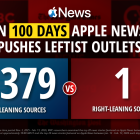Senator Ted Cruz (R-TX) hammered Google from the very beginning of the Senate Judiciary Committee’s hearing, “Google and Censorship through Search Engines.”
In his opening statement, the senator began by saying, “Any inquiry into Big Tech’s censorship practices must take a hard look at Google.” Noting that Google has “almost 90 percent” of internet users, Cruz stated: “Google can and often does control our discourse.” He defended this thesis by reminding those at the hearing that Google was not a mystical force, but rather run by people. “It’s a computer program written and maintained by people.”
 The July 16 hearing stemmed from a previous hearing that was meant to analyze the behavior of Facebook, Twitter, and Google all together. Google failed to comply with the standards set by Cruz at the time by not sending an executive to testify.
The July 16 hearing stemmed from a previous hearing that was meant to analyze the behavior of Facebook, Twitter, and Google all together. Google failed to comply with the standards set by Cruz at the time by not sending an executive to testify.
At the Google hearing, Cruz attacked the curtain that both Google and its sister company, YouTube, hide behind — “hate speech.” Cruz said called the concept of “hate speech” as “an ever-changing and vague standard, meant to give censorship an air of legitimacy.” The senator argued that this weapon was used to shape culture, destroy rivals, and “ban speech.”
[ads:im:1]
When Cruz began to refer to section 230 of the Communications Decency Act, he suggested that it was not being used by tech companies in the way that legislators had intended. “Congress never intended to empower large technology companies to control our speech,” said Cruz. He then said that platforms that behave like publishers, such as The New York Times and The Wall Street Journal, were responsible legally for any and all content posted under their names. Google and YouTube enjoyed a privilege that no one else does, because of this clause.
[video:https://www.mrctv.org/node/541503 align:center]
The bargain, stated Cruz, was that Big Tech remain politically neutral in order to enjoy this privilege. “We expected tech companies, in the business of carrying others’ speech, wouldn’t favor any side when they did so,” he said. “There wouldn’t be a conservative internet and a liberal internet. There would just be an internet.”
As Cruz told the hearing, it was obvious “That bargain today is falling apart.”
[ads:im:2]









